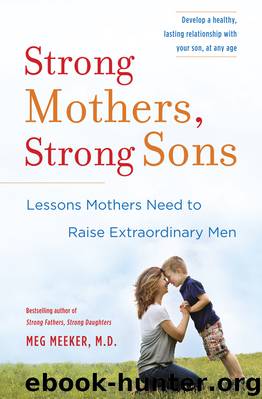Strong Mothers, Strong Sons by Meg Meeker M.D

Author:Meg Meeker, M.D. [Meeker, Meg]
Language: eng
Format: epub
ISBN: 978-0-345-51811-8
Publisher: Random House Publishing Group
Published: 2014-04-07T16:00:00+00:00
Teach Him Confidence
The coddling begins early. Talk to any good high school teacher and he or she will tell you that one of the biggest obstacles young men face is being disabled by a loving mother. When our sons are in first or second grade we see them struggle with new ideas and we want to help them out. At first, we coach them in how to do their math problems, and before you know it, we’re starting and finishing dioramas, art projects, and history reports. We feel we have to “help out” because the world is competitive and we don’t want our sons to fall behind. But when we do this, we communicate to our sons that their work simply isn’t good enough without our assistance. By the time they hit fourth grade, many of us have fostered an unhealthy dependency in our sons.
Many mothers feel stuck between trying to teach their sons how to do things on their own and not wanting them to be at an academic disadvantage because other parents of his classmates are doing too much work for their kids. I feel that in situations like this, mothers must go to the teacher and address the problem. The truth is, kids may get better grades if their parents are doing their work, but in the end, everyone loses. The boys who do their own work may get lower grades, and the boys whose parents do their work get higher ones, but the latter never learn what their true capabilities are.
One of the main reasons moms step in and do too much for their sons is that they see him struggling in a certain area and think that picking up the slack for him is the solution. Maybe our son is strong academically, but he seems physically different from the other boys in his class; a bit chubby or athletically clumsy. We desperately want our son to be respected and accepted by his peers, but too often we try to force him to be something he’s not, encouraging him to play ball when he’d rather read or suggesting he try out for a team sport when he doesn’t want to. Feeling sorry for our sons because they don’t fit into the “norm” is different from feeling empathy, and they soon get the message that they are deserving of pity.
Empathizing with a son who lacks athletic prowess, academic strengths, or social skills means that we understand his difficulties and recognize that they will make life more challenging for him. Empathy allows us to be sensitive to his issues, but not take on responsibility for them. It brings us to the point where we can understand the struggles our son faces, but ensures that we keep up healthy and appropriate boundaries when dealing with these struggles, boundaries that are critical to the healthy development of his identity as a man.
Let’s say that your son is athletically challenged. He really wants to play football but is rejected time after time by coaches who say that he isn’t good enough for their team.
Download
This site does not store any files on its server. We only index and link to content provided by other sites. Please contact the content providers to delete copyright contents if any and email us, we'll remove relevant links or contents immediately.
| Early Childhood | Parenting Boys |
| Parenting Girls | School-Age Children |
| Single Parents | Teenagers |
The Lost Art of Listening by Michael P. Nichols(7506)
Rich Dad Poor Dad by Robert T. Kiyosaki(6632)
We Need to Talk by Celeste Headlee(5615)
I Love You But I Don't Trust You by Mira Kirshenbaum(3876)
The Complete Idiot's Guide to Coping With Difficult People by Arlene Uhl(3149)
Rich Dad Poor Dad: What The Rich Teach Their Kids About Money - That The Poor And Middle Class Do Not! by Robert T. Kiyosaki(2958)
A Burst of Light by Audre Lorde(2607)
The Book You Wish Your Parents Had Read (and Your Children Will Be Glad That You Did) by Philippa Perry(2528)
Dealing with People You Can't Stand by Dr. Rick Brinkman(2460)
Life Hacks by Dan Marshall(2456)
An Odyssey by Daniel Mendelsohn(2308)
The Expectant Father by Armin A. Brott & Jennifer Ash(2273)
Teach Your Child How to Think by Edward De Bono(2159)
No Time to Say Goodbye(2117)
What I Need by J. Daniels(2082)
The 7 Habits Of Highly Effective Teens by Covey Sean(2080)
The Out-of-Sync Child by Carol Stock Kranowitz(2054)
The Anxious Generation by Jonathan Haidt(2051)
I Don't Belong to You by Keke Palmer(2005)
